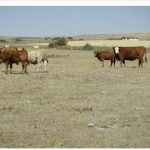WINNIPEG – Arthur Kroeger could be forgiven for wondering if he was in friendly or enemy territory.
Standing before delegates at the annual meeting of Agricore for a question and answer session, he heard his report on grain transportation reform praised, condemned and everything in between.
The wide range of views highlights the problems that the fledgling prairie-wide co-operative is having in dealing with the contentious and divisive transportation issue.
“It’s a very, very difficult situation for Agricore,” said delegate Bill Ridgeway from Grosse Isle, Man.
Read Also

Land crash warning rejected
A technical analyst believes that Saskatchewan land values could be due for a correction, but land owners and FCC say supply/demand fundamentals drive land prices – not mathematical models
As a farmer-owned co-op with members in every part of the Prairies engaged in every kind of farming, it’s not easy to identify exactly where Agricore’s interests lie.
“From a corporate point of view, Agricore the grain company could do marvelously from Kroeger,” said Ridgeway. “As individual farmer members, is that going to translate back?”
Agricore officials have endorsed most, but not all, of the Kroeger report, supporting his proposal for a reduced rail revenue cap and ending the Canadian Wheat Board’s role in transportation, but saying more needs to be done to encourage competition between the railways.
A report prepared by the company says the changes recommended by Kroeger would put an additional $216.5 million into farmers’ pockets through lower freight rates, reduced storage charges, more efficient use of rail cars, lower handling tariffs and reduced demurrage.
“We haven’t convinced all of our delegates and members on this,” said chief executive officer Gordon Cummings. “If you don’t believe in the benefits of the competitive, market system and are more comfortable with a command, control, administered system, you’re never going to agree with us. It’s as simple as that.”
Positive side
During his speech to delegates, Kroeger repeatedly talked up the benefits of moving to a more commercial, less regulated system.
“Do you want to take some chances and maybe get a big payoff, or do you want to stay with what you’ve got … a system that is prone to failure and could fail again?” he asked.
Some delegates weren’t impressed, saying Kroeger offered nothing more than ideology.
“He’s asking for a tremendous leap of faith on behalf of farmers with absolutely no security or safety net at the end of it,” said Ridgeway.
But a fellow delegate said farmers need a more market-driven system, and the quicker the better.
“Farmers have been struggling for years with the transportation system,” said Harry Schudlo, of Sexsmith, Alta. “Change is needed.”
He said more accountability is needed in the system and the way to achieve that is to make the grain companies and railways contractually responsible for getting grain to port.
Schudlo added it’s not surprising there would be divergence among Agricore delegates on such a highly charged subject, saying with a laugh that “there are differences in my back yard on this.”
Rene Blanchette of Girouxville, Alta., said the majority of Agricore delegates recognize that changes are needed, but want more guarantees that farmers will benefit from changes.
Delegates later defeated a resolution calling on the organization to support the so-called “farmers’ proposal” put together by the three prairie provincial umbrella farm organizations.
















